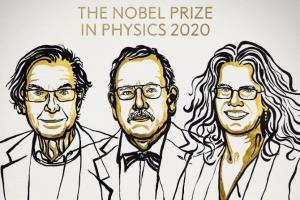The prize amount is 10 million Swedish kronor (approximately $1.12 million), with one half going to Penrose and the other half jointly to Genzel and Ghez

Roger Penrose of UK, Reinhard Genzel of Germany and Andrea Ghez of the US won the Nobel Physics Prize. Pic/@NobelPrize
The Royal Swedish Academy of Sciences on Tuesday decided to award the Nobel Prize in physics to Oxford University professor Roger Penrose, German scientist Reinhard Genzel and American physicist Andrea Ghez for their discoveries about black hole.
ADVERTISEMENT
The prize amount is 10 million Swedish kronor (approximately $1.12 million), with one half going to Penrose and the other half jointly to Genzel and Ghez.
"The discoveries of this year's Laureates have broken new ground in the study of compact and supermassive objects. But these exotic objects still pose many questions that beg for answers and motivate future research," David Haviland, Chair of the Nobel Committee for Physics, said in a statement.
"Not only questions about their inner structure, but also questions about how to test our theory of gravity under the extreme conditions in the immediate vicinity of a black hole."
UK-born Penrose showed that Albert Einstein's general theory of relativity leads to the formation of black holes.
Born in Germany, Genzel is a Director at Max Planck Institute for Extraterrestrial Physics, Garching, Germany and Professor at University of California, Berkeley, US.
Ghez, who was born in New York, is a Professor at the University of California, Los Angeles, US.
Genzel and Ghez discovered that an invisible and extremely heavy object governs the orbits of stars at the centre of our galaxy.
A supermassive black hole is the only currently known explanation.
Penrose used ingenious mathematical methods in his proof that black holes are a direct consequence of Einstein's general theory of relativity.
Einstein did not himself believe that black holes really exist, these super-heavyweight monsters that capture everything that enters them.
In January 1965, ten years after Einstein's death, Penrose proved that black holes really can form and described them in detail.
His "groundbreaking" article is still regarded as the most important contribution to the general theory of relativity since Einstein, The Royal Swedish Academy of Sciences said.
Keep scrolling to read more news
Catch up on all the latest Crime, National, International and Hatke news here. Also download the new mid-day Android and iOS apps to get latest updates.
Mid-Day is now on Telegram. Click here to join our channel (@middayinfomedialtd) and stay updated with the latest news
This story has been sourced from a third party syndicated feed, agencies. Mid-day accepts no responsibility or liability for its dependability, trustworthiness, reliability and data of the text. Mid-day management/mid-day.com reserves the sole right to alter, delete or remove (without notice) the content in its absolute discretion for any reason whatsoever
 Subscribe today by clicking the link and stay updated with the latest news!" Click here!
Subscribe today by clicking the link and stay updated with the latest news!" Click here!






